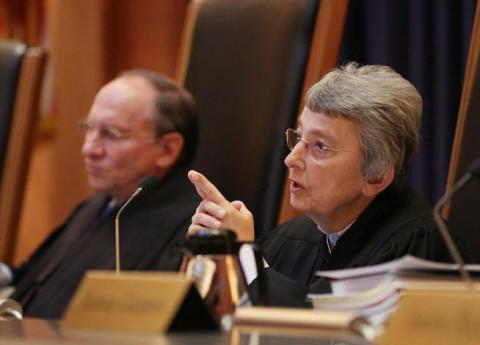Massachusetts court officers cannot hold a suspected illegal immigrant in custody at the request of federal immigration agents if there is no criminal warrant or criminal detainer, the state’s highest court today found today in a blockbuster ruling sure to send shockwaves through the Bay State's immigration enforcement system.
"Massachusetts law provides no authority for Massachusetts court officers to arrest and hold an individual solely on the basis of a Federal civil immigration detainer beyond the time that individual would otherwise be entitled to a release from State custody,” the unanimous Supreme Judicial Court ruling states.
The case was brought to the SJC by a Cambodian national named Sreynuon Lunn who was in custody on a case out of Boston Municipal Court. Unable to post a $1,500 bail, Lunn was held until his trial date, Feb. 6 of this year, at which time the charges were dismissed when Suffolk prosecutors could not move forward with a trial.
However, Judge Michael Coyne refused to release Lunn due to a request from Immigration and Customs Enforcement, according to court documents. Lunn was moved to federal immigration custody, and his lawyer appealed to the state's high court to determine whether Massachusetts law allows a state court officer to keep someone in custody if there are no pending criminal charges.
“It is undisputed in this case that holding someone in circumstances like this, against his or her will, constitutes an arrest under Massachusetts law,” the ruling states. “There is no Federal statute that confers on State officers the power to make this kind of an arrest.”
The court determined state laws do not allow for this type of an arrest either, the decision states.
“In short, this was a civil immigration detainer,” the justices wrote. “It alleged that Lunn was subject to, and was being sought by the Federal authorities for the purpose of, the civil process of removal. It was not a criminal detainer or a criminal arrest warrant. It did not allege that the Federal authorities were seeking Lunn for a criminal immigration offense or any other Federal crime, for purposes of a criminal prosecution.”
Under Massachusetts law, the court said, police officers and court officers have limited power to make warrantless arrests. They may do so only for criminal offenses.
“Conspicuously absent from our common law is any authority (in the absence of a statute) for police officers to arrest generally for civil matters,” the justices state, “let alone authority to arrest specifically for Federal civil immigration matters.”
The SJC heard oral arguments April 4. Joshua Press, the lawyer representing the federal government, unsuccessfully argued that Bay State authorities can hold a person after criminal charges have been dismissed.
“You have that power," Press argued. “As we understand it, no law has circumscribed the state or the commonwealth's power to cooperate with the federal government in these matters.”
ICE did not immediately respond to a request for comment today.
Attorney General Maura Healey’s office had clashed with the DOJ on the case, arguing state law enforcement can't detain someone at ICE's request unless the detainer “is accompanied by a warrant issued by a neutral and detached magistrate" or there is probable cause that the person has committed a state or federal felony.
"This is the first statewide decision in the nation on whether local law enforcement officials may, as a matter of state law, detain someone at the request of federal immigration authorities," Healey's office said in a statement. “Today’s decision is a victory for the rule of law and smart immigration and criminal justice policies, and a rejection of anti-immigrant policies that have stoked fear in communities across the country. As my office argued in this case, Massachusetts law protects our residents from illegal detention and prevents the federal government from forcing local law enforcement to make decisions contrary to the public safety interests of their communities. This decision allows local law enforcement to focus their resources on keeping people safe.”
The statement added: "The decision also makes clear that this is a matter that is best addressed by the Legislature, if they wish to do so."
Carol Rose, the executive director of the Massachusetts chapter of the American Civil Liberties Union, also hailed the decision, calling it a "victory" that is "the first of its kind in the nation."
"At a time when the Trump administration is pushing aggressive and discriminatory immigration enforcement policies, Massachusetts is leading nationwide efforts by limiting how state and local law enforcement assist with federal immigration enforcement," Rose said in a statement this morning. "Now more than ever, we need to send a clear message that Massachusetts stands with our immigrant neighbors."
Lunn was represented by a public defender through Committee for Public Counsel Services.
"Today the Supreme Judicial Court has affirmed that Massachusetts does not authorize our courts, jails, or police officers to arrest for civil immigration purposes – even at the request of federal authorities through an immigration detainer," CPCS Immigration Impact Unit staff attorney , Emma Winger, lead counsel for Lunn, said in a statement.
“Massachusetts law enforcement officers and courts are well-equipped to protect the public, without detaining people for purported civil immigration infractions. The Court’s decision does nothing to prevent federal immigration officers from arresting people themselves – they simply may not use our courts and officers to do their work,” said Anthony Benedetti, Chief Counsel of CPCS.
Lunn had been charged with a single count of larceny from a person for allegedly stealing money from a homeless person during an Oct. 22, 2016, incident on Canal Street, according to Suffolk District Attorney Spokesman Jake Wark. When the alleged victim did not show up at either of two scheduled trial dates, the court dismissed the case without prejudice since prosecutors could not proceed with the trial.



Spread the word